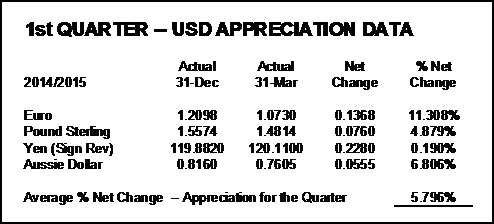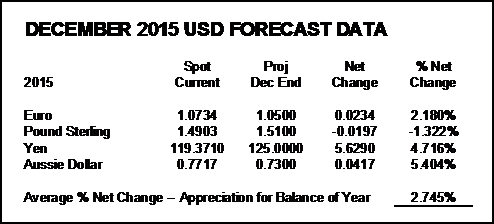The first quarter forex results are in, but forecasts for the remainder of the year appear balanced to the point of being overly boring. Conservative may be a better word to use, but, after the Almighty Dollar continued its rampage during the first three months, notching up another 5.8% versus its four top rivals, currency gurus from the banking sector are projecting a meager 2.75% rise for the balance of the 2015. It is also interesting to note that the consensus for euro parity with the dollar has been pushed back to the last quarter of 2016, an acknowledgement that QE in Europe will dilute.
If these forecasts are anywhere near being correct, then they foretell another near-death summer of low volatility in the forex world. When currency pairs were caught in tight ranges for an extended period of time last year, all manner of records were set for lackluster volatility measures. The obvious pressure then fell on forex brokers, where low volume meant less revenue, which eventually led to closures and consolidation within the brokerage community. For current forex brokers that are holding onto a thread after the Swiss Franc Debacle, a summer of dismal volume trends may be the proverbial straw that breaks their respective backs.
First Quarter Results
Right on the heels of appreciation of 6% during the final quarter of 2014, the greenback mounted another charge of equal strength in early 2015. Here are the actual figures:

The euro was most severely impacted, but the pound and Aussie nearly repeated their previous quarter results (4.9% and 6.8%, respectively). The yen had already taken a beating of 9.4% during the same period, while the BoJ maintained a 120 valuation for the last three months. The “120” level was seen as the appropriate value by central planning authorities to spur exports and increase GDP growth.
The first quarter closed with uncertainty mounting after the Fed pushed adjusting its benchmark interest rates beyond June 30th. This unanticipated delay sent markets in reverse at the same time that the European economy was showing actual signs of life. The only rain on their parade, however, was a threatened Greek default on EU and IMF payback obligations, not to mention other government payments to employees, vendors, and bondholders. On the other side of the globe, Asia was in pullback mode after China kept revising growth estimates downward.
Revised 2015 Forex Forecasts
With this picture of global economic concerns as a backdrop, it is not terribly surprising that currency forecasters would play it safe and extend current spot rates with only minor changes in Europe and an allowance for continued weakness in Asia. The takeaway, however, is that a Fed rate increase in the latter half of the year will have little, if any, impact on forex valuations, almost business as usual, so to speak. Most bank analysts missed the huge USD correction in their previous forecasts and are now a bit gun shy, as one might expect. Here are the consensus forecasts as of this date (be aware that these have a way of changing without notice):

The changes in Europe are very nearly equivalent to the degree of error in any forex forecast for this time period. In other words, the analysts are betting that favorable economic data will offset the Fed’s actual raising of rates and the downward pull of bad tidings in Greece. As for Asia, the BoJ will most likely have to become more accommodating to get the desired results, as will banking officials in Australia. A rate cut in Aussieland is already being discussed in the press.
What are the various economic scenarios that support these forecasts?
The fundamental outlook has not dramatically changed. Divergence of monetary policy still rules the day, but the vast majority of analysts foresee a slight pullback and consolidation of the greenback, with a resumption of upward appreciation in the fall of the year. The pace of change will be subdued, as investors learn to look more long term, rather than overreact to the monthly release of contrary economic data. Oil prices and related inventories will continue to stagnate, as the closure of rigs and over supply dynamics take a year to work their way out of the market.
Will political tensions heat up again in the Ukraine and the Middle East? Falling oil prices have subdued much of the vocal rhetoric, while sanctions in Iraq and Russia may produce more diplomatic solutions in the long run. In any event, pundits are not seeing the level of saber rattling that plagued 2014. Maybe cooler heads will prevail, but the focus will still be on Greece and its new ruling party. News articles are reviving old thoughts regarding a “Grexit” and whether Germany will tolerate lower productivity gains in the rest of Europe for much longer. Mario Draghi will be tested, but what else is new? As for the UK, they are battling near-zero inflation. Rate increases will occur in 2016, but the timing is in doubt as to which quarter. May elections may also cause reversals.
The U.S. economy will continue to lead, picking up steam in the latter half of 2015 and supporting a rate hike by the Fed in September. The big question mark, however, is China and its impact on the whole of Asia. GDP growth forecasts have continually been ratcheted downwards, now hitting 7%, but is this figure to be believed? Real estate unit inventories are growing well past domestic demand, without any end in sight. The Chinese central bank has eased up on reserve requirements and interest rates to improve liquidity, but it appears that billions in new liquidity have only served to raise stock prices on the Shanghai Exchange, not help small and medium sized enterprises to prosper. Our guess is that Chinese officials learned nothing from similar attempts in the U.S. and Europe. Australia and New Zealand must wait in limbo for growth to accelerate.
What worldwide events could seriously put these forecasts in doubt?
Financial markets of late have taken on a more gradual tone, resisting the sudden knee-jerk reactions that have characterized the last seven years. Are markets now emulating the demeanor of central bankers that have created the belief that gradual is always better? Central bankers have already been warning of a massive liquidity crunch, if an event were severe enough to warrant a tidal wave of carry-trade reversals. Capital outflows from emerging market countries have already had an impact, but there is another estimated $11 trillion overhang to deal with. What might the “trigger” be?
1) S&P 500 Earnings Recession: The current bull market is in its sixth year and setting records. Analysts have been forecasting its end for over 18 months, but to no avail. Sooner or later, however, the impact of an appreciating U.S. dollar must be felt on the bottom line of companies that devote more than half of their efforts in overseas operations. The doomsayers are out in force, but opposing opinions have counter arguments, as well. Earnings declined for the December quarter. If they decline again for the first quarter, will the bears get their way? Will stocks plummet, sending investors to the exits?
2) European Politics: Europe and Politics are often synonymous, and 2015 will be no exception. The UK government may soon be tested, but the major focus will be on Greece and its new team of neophytes at the helm. Debt payments are due, and requests for bail out funds may not be honored. Capital flows out of Europe have already begun, but could accelerate in earnest if the threat of another default materializes. The region will also watch Russia, Iran, Syria, and ISIS factions closely, as well, but this is not new.
3) Asian/Pacific Crisis: Asia/Pacific countries sidestepped the Great Recession, primarily due to the prevailing growth dynamics present in China. Global economies, however, are more interconnected than ever before, and what goes around must eventually come around to all participants. China and other tiger economies have benefited greatly from off-shoring activities from the West, but, at the end of the day, the ultimate consumers of manufactured goods have predominantly been Western countries. Eventually, the drop in Western demand has to be felt in more ways than dropping GDP growth from 7.5% to 7%. The Chinese Machine is without an historical predecessor. The downward trend of Chinese economic data is decades long. One would think that something has to give and in a big way. Time will tell.
Concluding Remarks
The current wave of forex forecasts could easily be labeled as flat or steady as she goes. The metaphor that comes to mind is a pot of water, heated to just below the boiling point. A few bubbles can be seen just beneath the periphery, an indication that a larger reaction might be imminent. Central bankers have twisted the international economic infrastructure into a highly coiled spring, but will it unleash its fury all at once or be slowly and gradually unwound? Will the pot erupt into a boiling chaotic system?
There is uncertainty in the market that justifies current daily forex ranges, but we are in a holding pattern, much as with last year at this time. The Average True Range (ATR) for the euro did top up recently, but that was perhaps due to a short squeeze. The Short-euro trade has been heavily populated at record levels on CFTC Commitment of Traders Reports, but the jury is still out on this trade.
Are these forex forecasts to be taken at face value? Forex analysts try to make their best estimates, but they rarely hit the mark. There are just too many variables, especially the ones that are surprises. But in the world of forex, change does spring eternal. Ranging behavior will not last forever. A trend shift will come about, and the best advice is to be prepared for it before it comes.
Risk Statement: Trading Foreign Exchange on margin carries a high level of risk and may not be suitable for all investors. The possibility exists that you could lose more than your initial deposit. The high degree of leverage can work against you as well as for you.
by Tom Cleveland